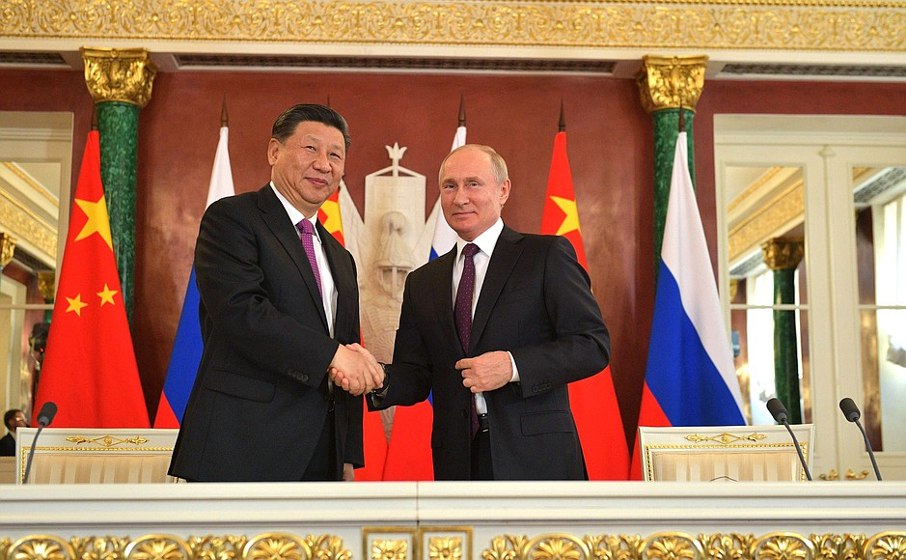The Great Wall of China and Red Square against the White House
Meeting of Xi Jinping and Vladimir Putin in Moscow
The Great Wall of China and Red Square against the White House, according to Iran Gate, looks into how and if China intends to mediate in the Ukraine war. Xi Jinping, the President of China, went to Moscow on the morning of March 20 for a three-day visit, a meeting the world is watching. In this meeting, these two great friends will address numerous bilateral issues, and according to Kremlin spokesman Dmitry Peskov, they will also discuss China’s proposal for peace with Ukraine.
This meeting, which the Chinese press extensively covered and from which much is expected, took place a day after Vladimir Putin, the President of Russia, made an unexpected visit to Mariupol in Ukraine on the war front, and more importantly, just a few days after the International Criminal Court issued an arrest warrant for Putin on charges of war crimes. A decision with high symbolic value that will have few consequences because Moscow, like the United States and Ukraine, does not recognize the jurisdiction of the International Criminal Court.
Nevertheless, the main focus of this summit is Beijing’s desire to mediate in finding a solution to end the conflict between Russia and Ukraine, although this announcement of China’s readiness to play the role of mediator does not resolve the fundamental ambiguity that China has revealed so far.
In an article written for the Russian press, Xi Jinping emphasized that the international community has realized that no country is superior to another, no government model is universal, and no country should dictate the international order. Finding a solution and agreement to end the conflict in Ukraine will be possible if the parties follow guidelines related to the concept of collective security.
Xi Jinping, the man of peace
Xi Jinping presents himself in Moscow as a man of peace, a role reinforced by the agreement and reconciliation of two fierce regional rivals, Saudi Arabia and Iran.
Additionally, the Chinese leader has recently proposed a 12-point peace plan to resolve the war between Russia and Ukraine, and after the meeting with Putin, he is likely to contact Volodymyr Zelensky, the President of Ukraine.
John Kirby, the spokesperson for the US National Security Council, told CNN that if you went to Moscow and sat at the table with President Putin for three days listening to his views on a war he started and may soon end, the least you should do is pick up the phone and call Zelensky, the President of Ukraine, and hear his perspectives and views as well.
Washington’s skepticism, which can be said to be shared to some extent by Europe, stems from the doubt that Beijing is not a neutral player in this conflict. For example, China’s peace plan says nothing about the withdrawal of Russian forces from the occupied territories of Ukraine but criticizes sanctions and what it calls Western double standards and secretly accuses NATO of provoking an attack on Moscow.
But for Xi Jinping, it is important to present himself as the only permanent member of the Security Council interested in peace and common prosperity, a narrative that worries the Americans.
Partners without limits
However, according to several observers, beyond these peace talks, this meeting is likely to lead to increased Chinese support for Russia because, despite numerous domestic and international challenges, the unlimited partnership announced by the two leaders at the opening of the Beijing Winter Olympics in February 2022 remains intact, and the year recently passed was a year of progress and further strengthening of these bilateral trade and financial relations.
Therefore, while Europe is trying to free itself from Russian energy today, China can buy oil and gas at lower costs, and Putin and Xi Jinping may soon announce that they want to accelerate the construction of another gas pipeline, which will bring the two countries closer together.
Also, supplying goods that Russia can no longer buy from the West is a profitable move for Beijing and Chinese companies, which will certainly be cautious to avoid facing Western sanctions. The boom in trade between Russia and China, especially Russian energy exports, will have positive reflections in the financial sector, and both purchases will likely continue their efforts to promote alternatives to the dollar as a global currency.
Strategic tightrope
While the relationship with Moscow is an unbreakable bond, relations with the West are also crucial for China’s economic prosperity and technological advancement. Even if Beijing has little hope of improving relations with the United States in the near future due to escalating tensions with Washington, it never wants to hasten the breakdown of relations and lose access to technology, markets, and financial relations with the West.
For this reason, China cannot unconditionally support Moscow or fulfill its requests for the supply of weapons, especially artillery shells and missiles. Last month, just as Beijing presented its peace plan, the United States warned China about providing lethal support and considering all aspects of this action.
And this is a sensitive point in the relationship between Moscow and Beijing, a painful point that suggests that even the most limitless friendship can be undermined.
Gideon Rachman in the Financial Times says the photos of Xi Jinping and Putin together in Moscow send a clear message: Russia and China remain close partners, a closeness linked to their shared hostility towards America and its allies.

